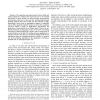1233 search results - page 103 / 247 » Feudal Reinforcement Learning |
ML
2002
ACM
13 years 7 months ago
2002
ACM
Solving in an efficient manner many different optimal control tasks within the same underlying environment requires decomposing the environment into its computationally elemental ...
SMC
2007
IEEE
14 years 2 months ago
2007
IEEE
—Reinforcement learning is a framework in which an agent can learn behavior without knowledge on a task or an environment by exploration and exploitation. Striking a balance betw...
IROS
2006
IEEE
14 years 2 months ago
2006
IEEE
— The aquisition and improvement of motor skills and control policies for robotics from trial and error is of essential importance if robots should ever leave precisely pre-struc...
ECML
2005
Springer
14 years 1 months ago
2005
Springer
This paper investigates a novel model-free reinforcement learning architecture, the Natural Actor-Critic. The actor updates are based on stochastic policy gradients employing Amari...
ICML
2010
IEEE
13 years 6 months ago
2010
IEEE
Temporal difference (TD) algorithms are attractive for reinforcement learning due to their ease-of-implementation and use of "bootstrapped" return estimates to make effi...

